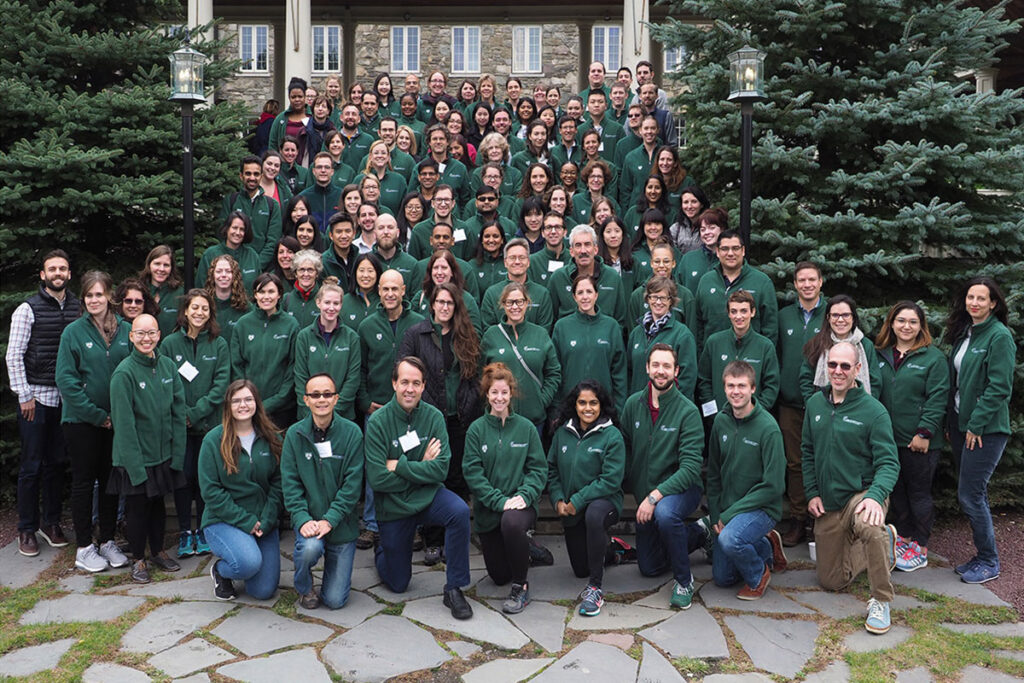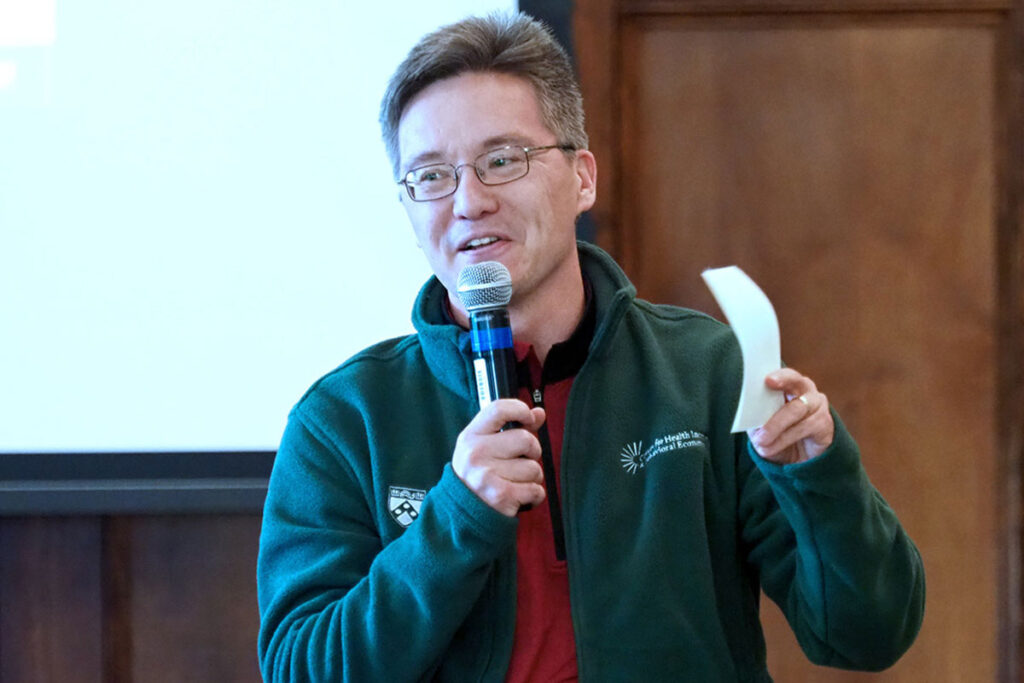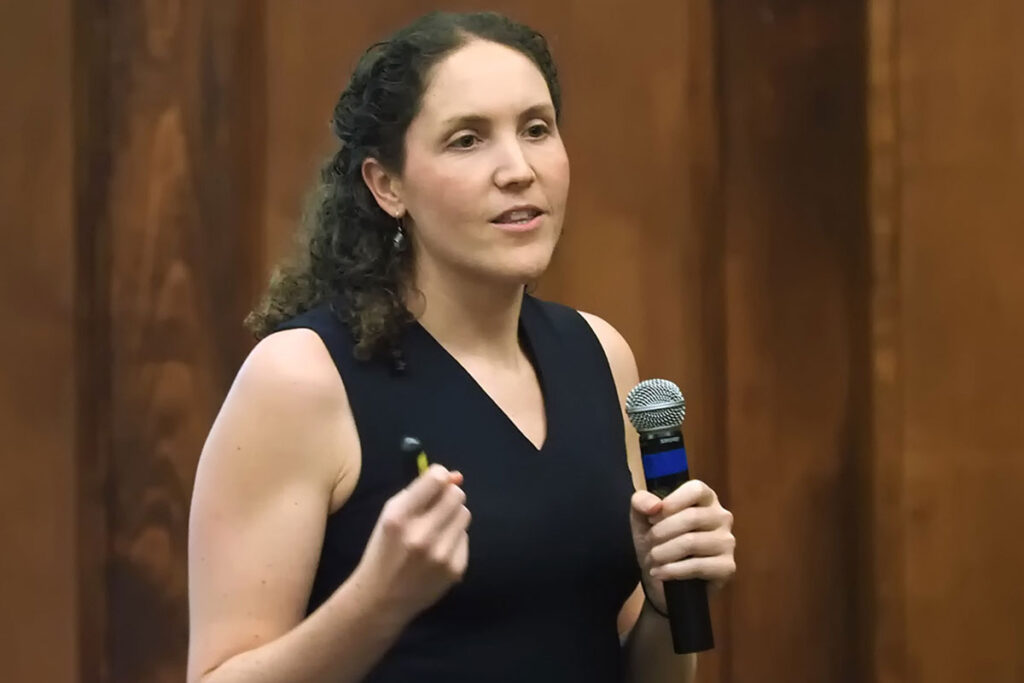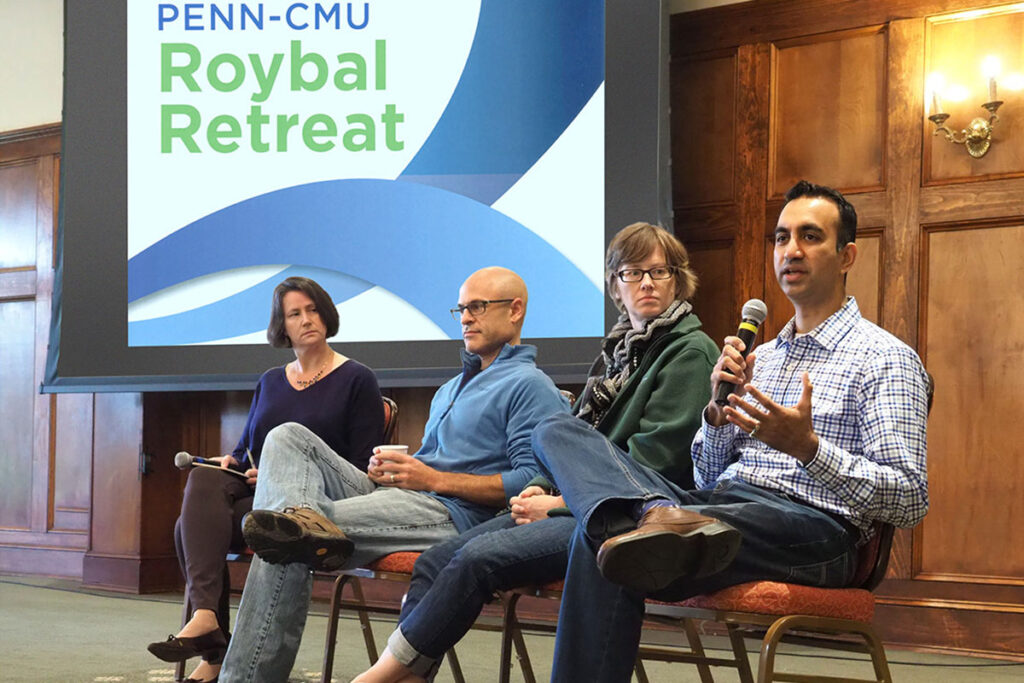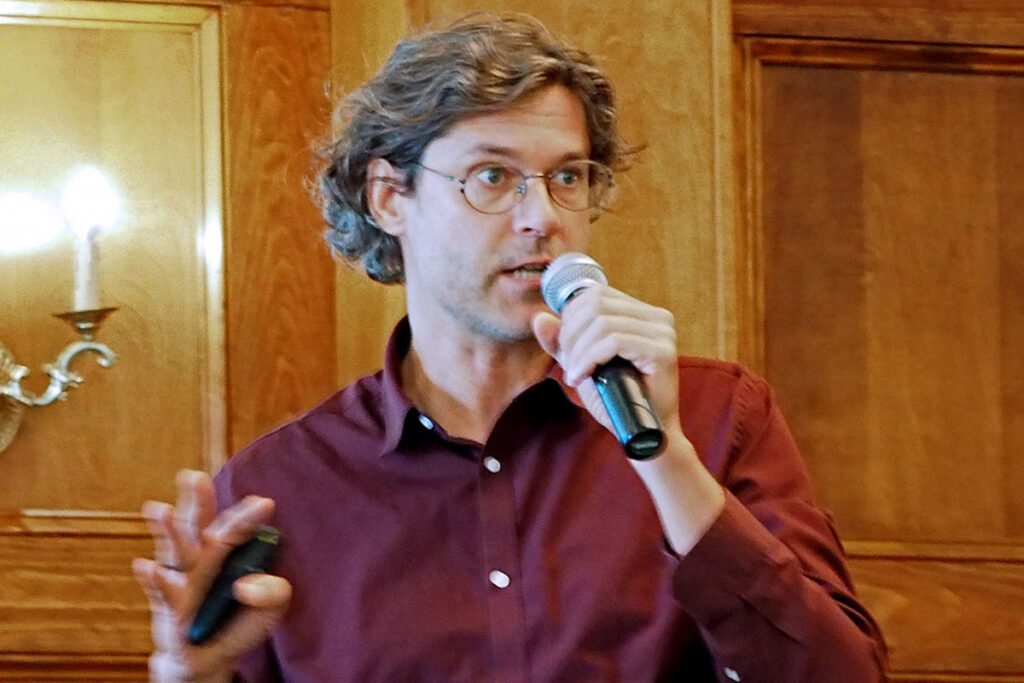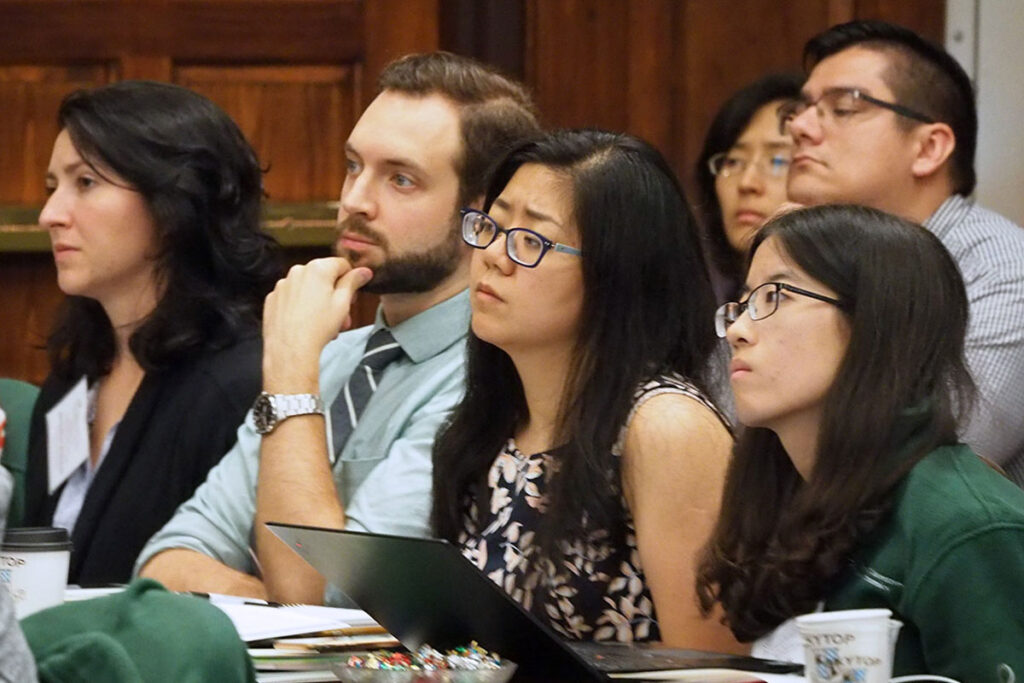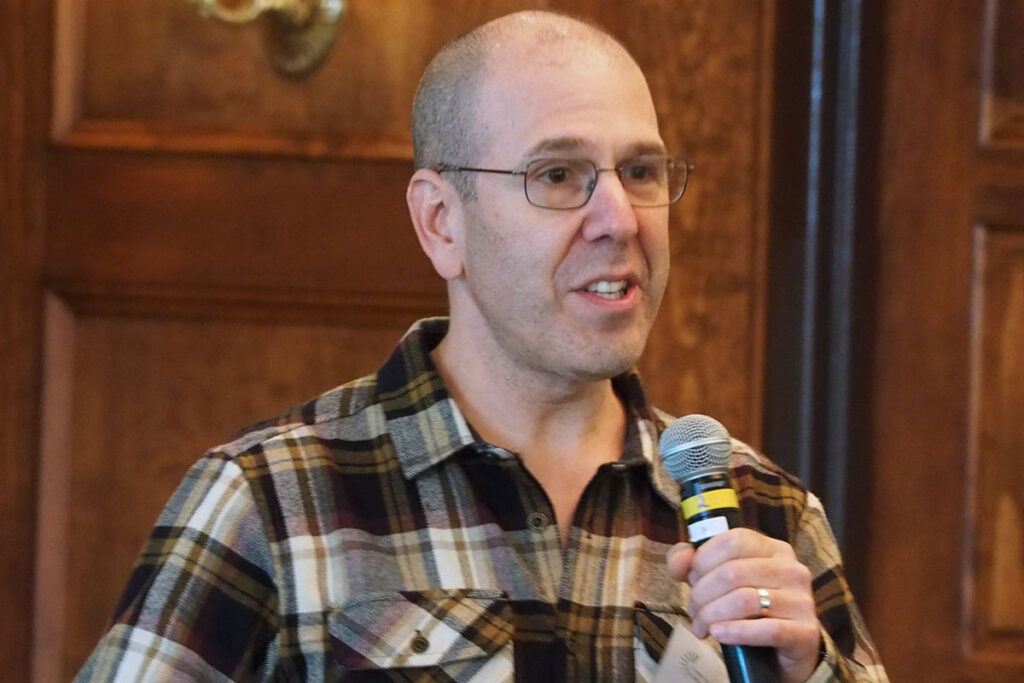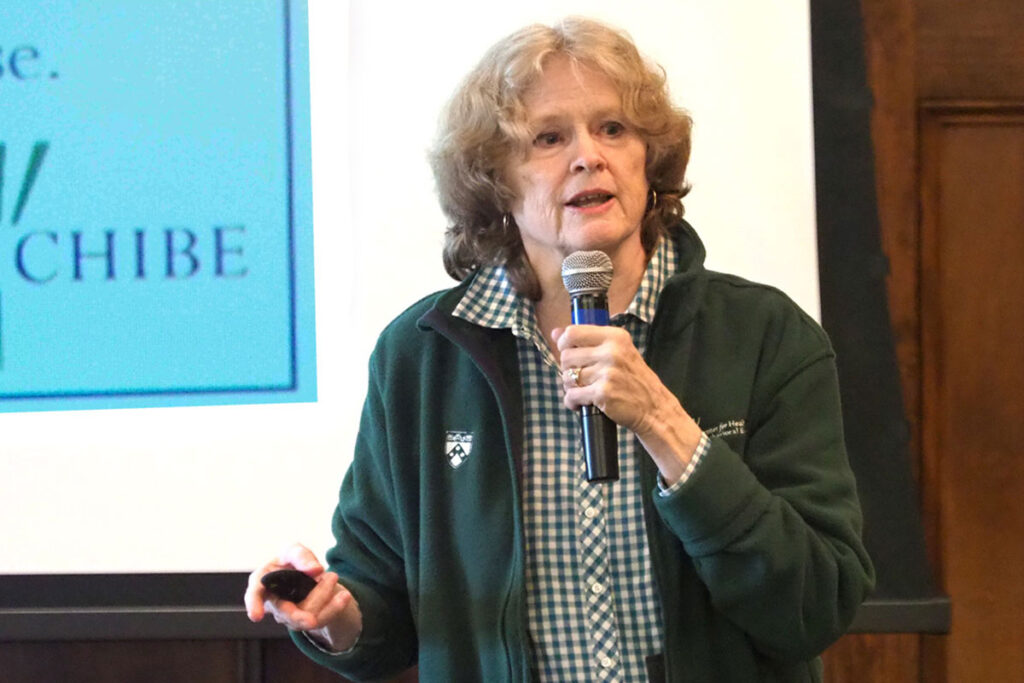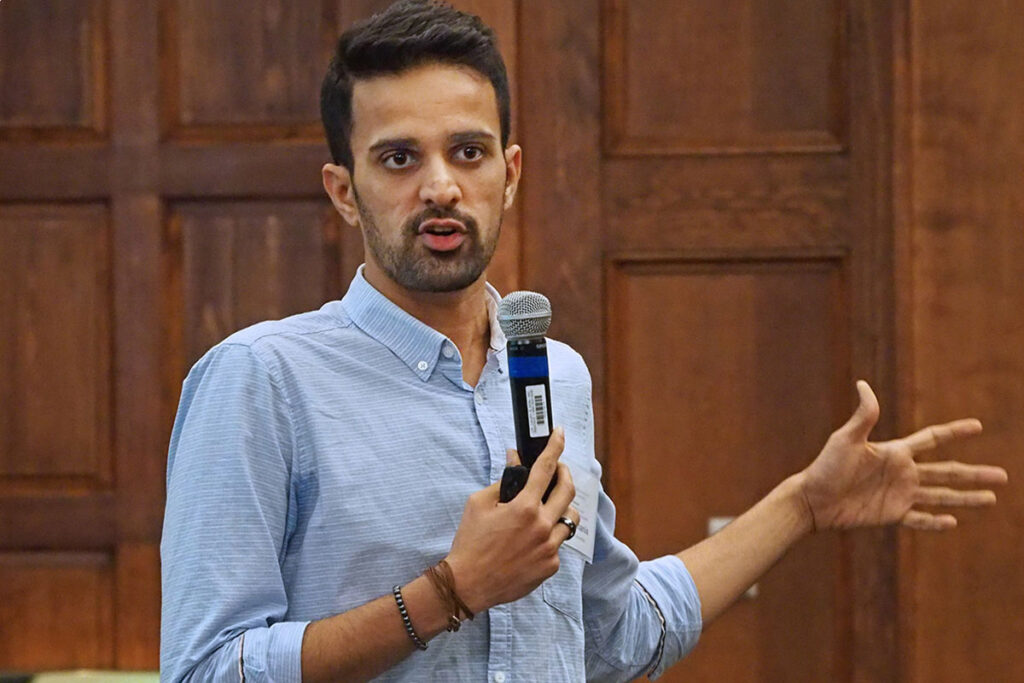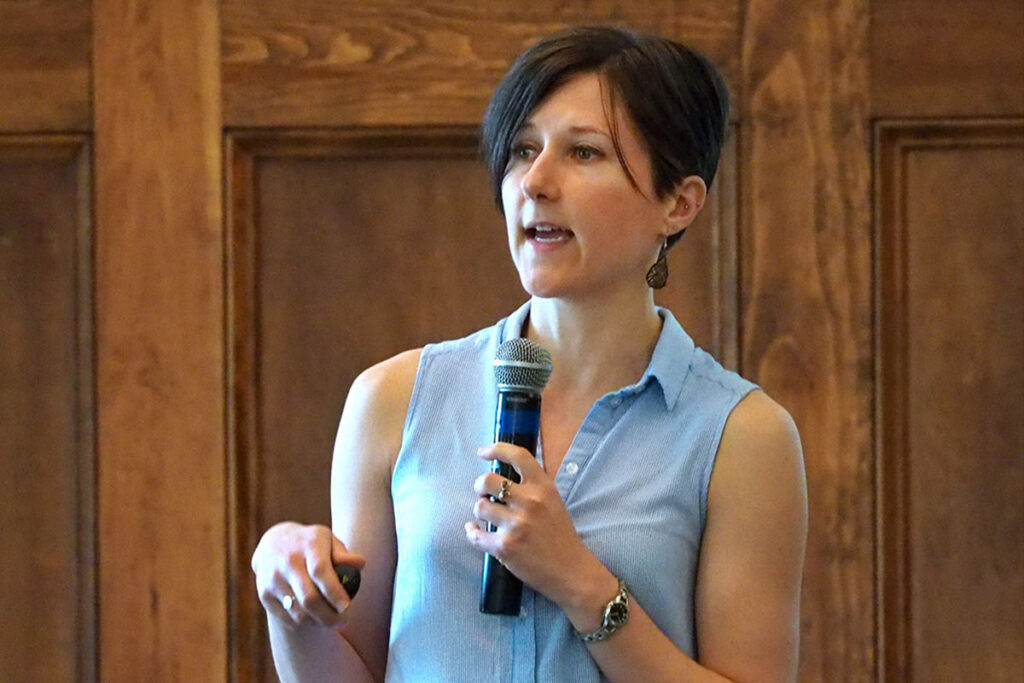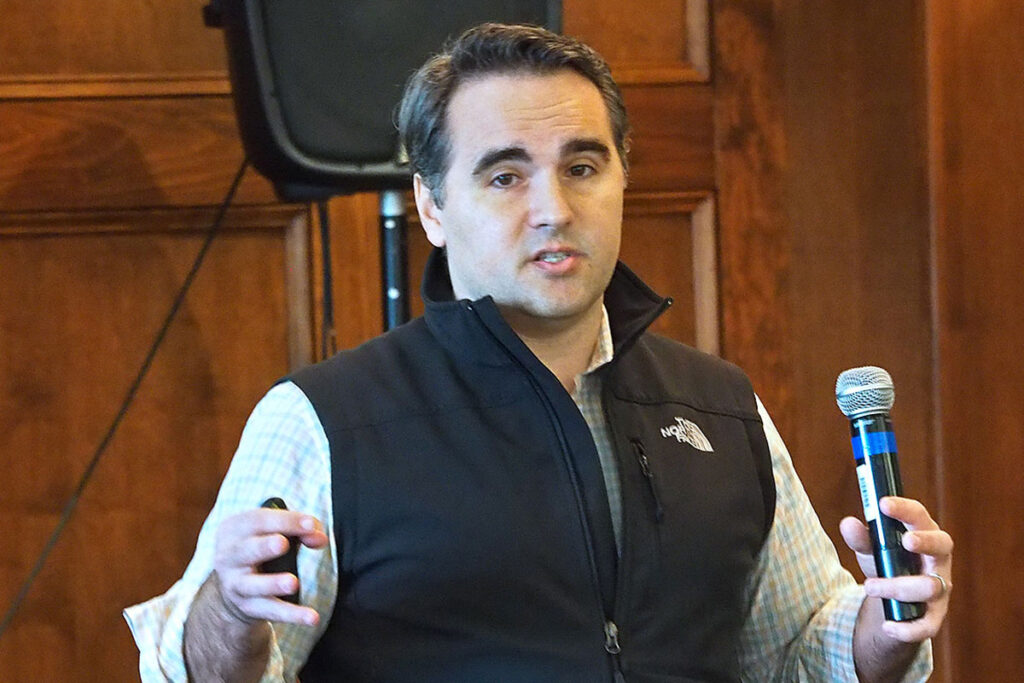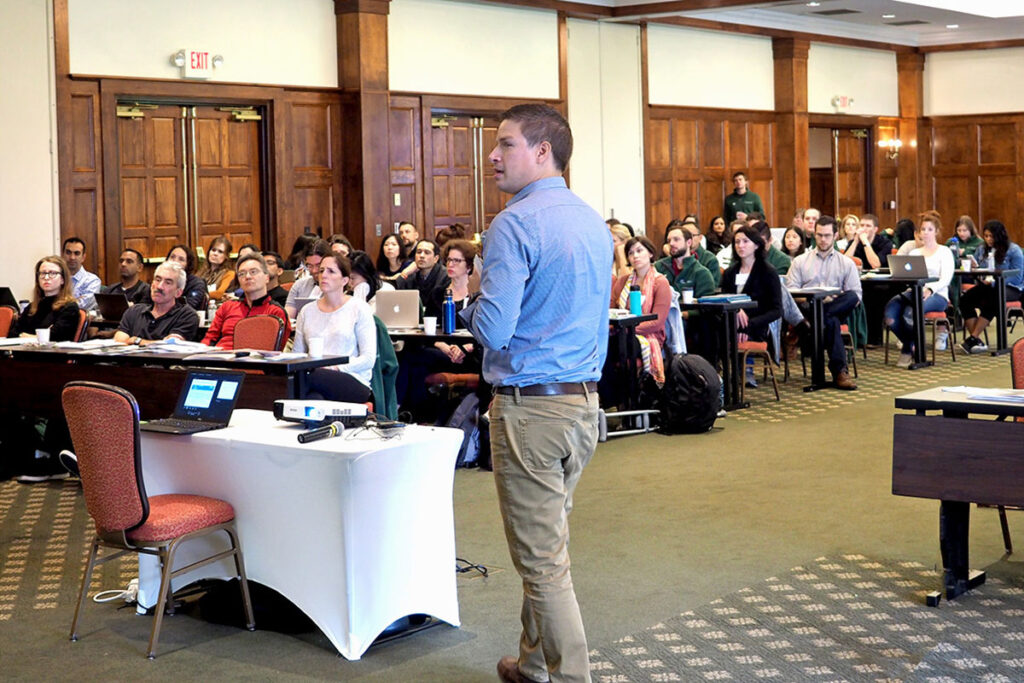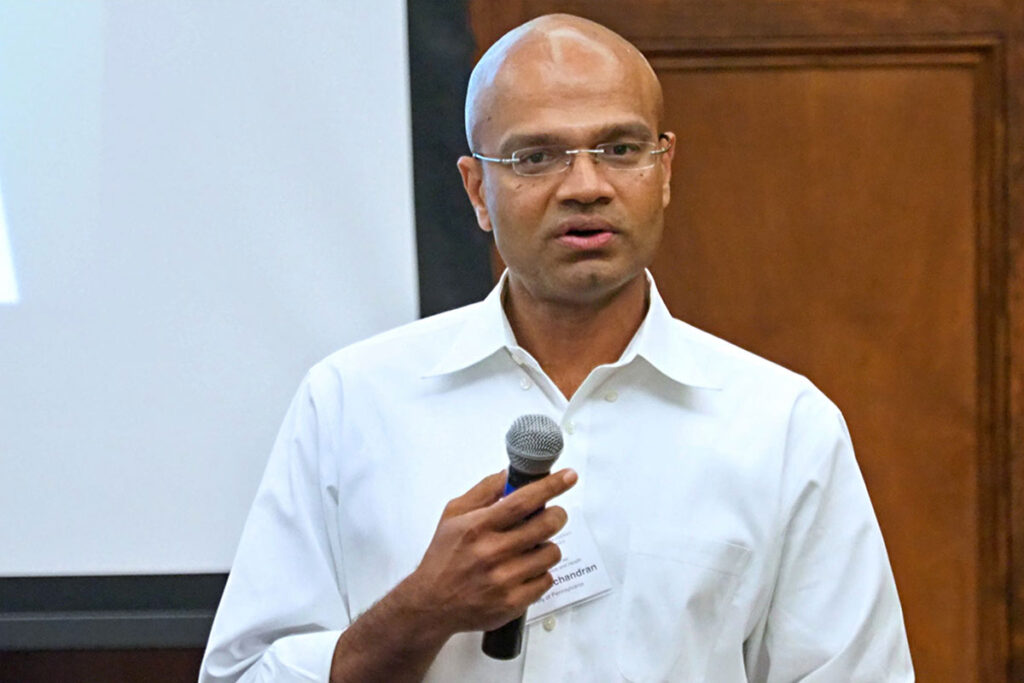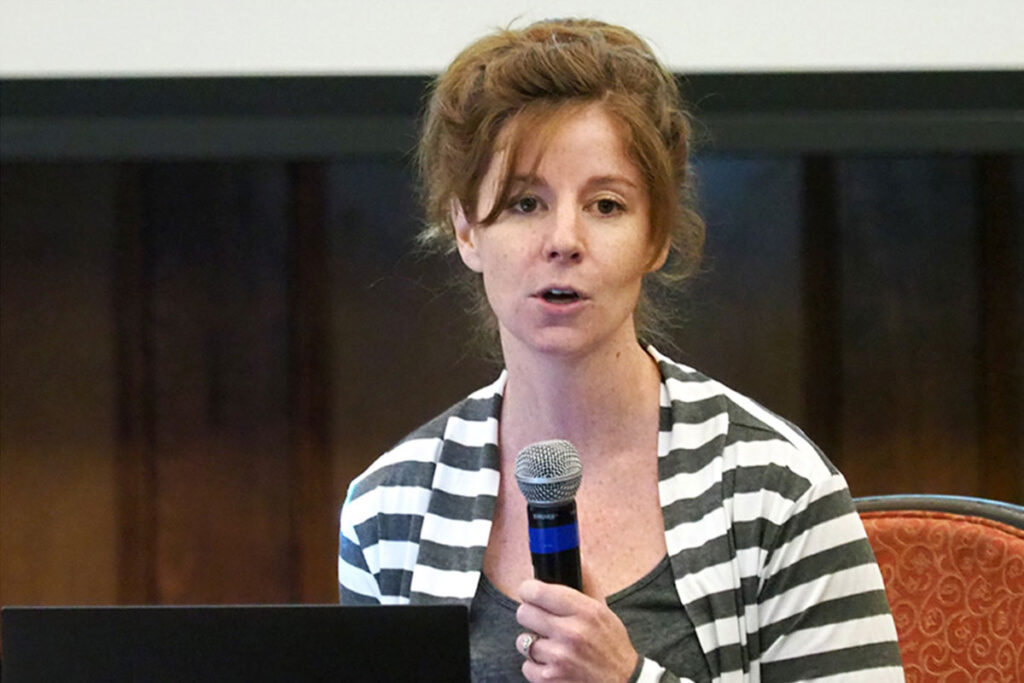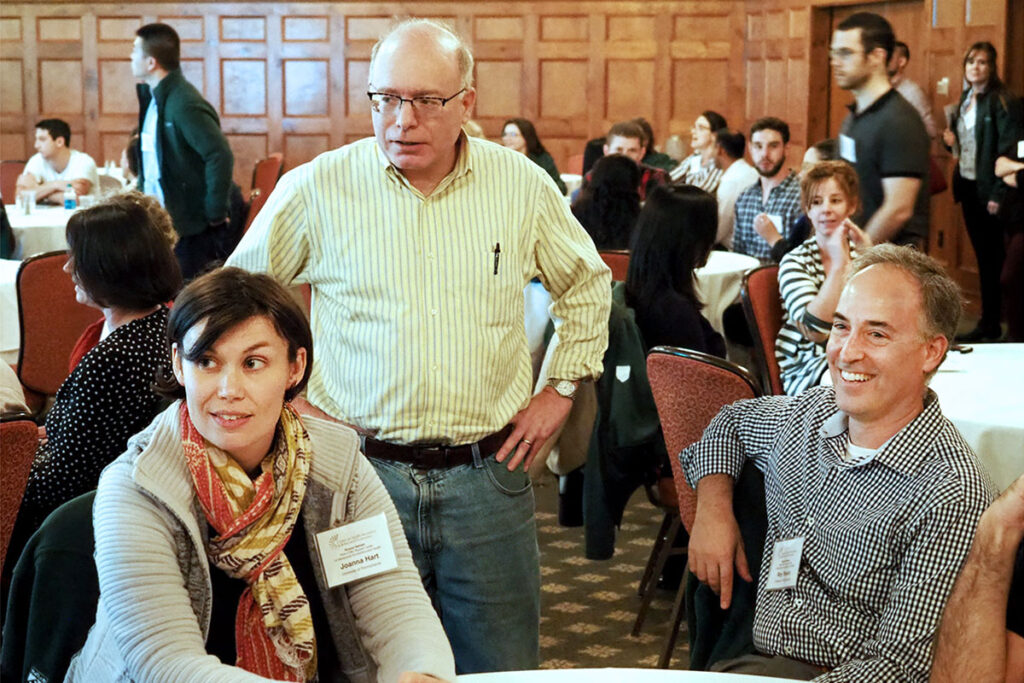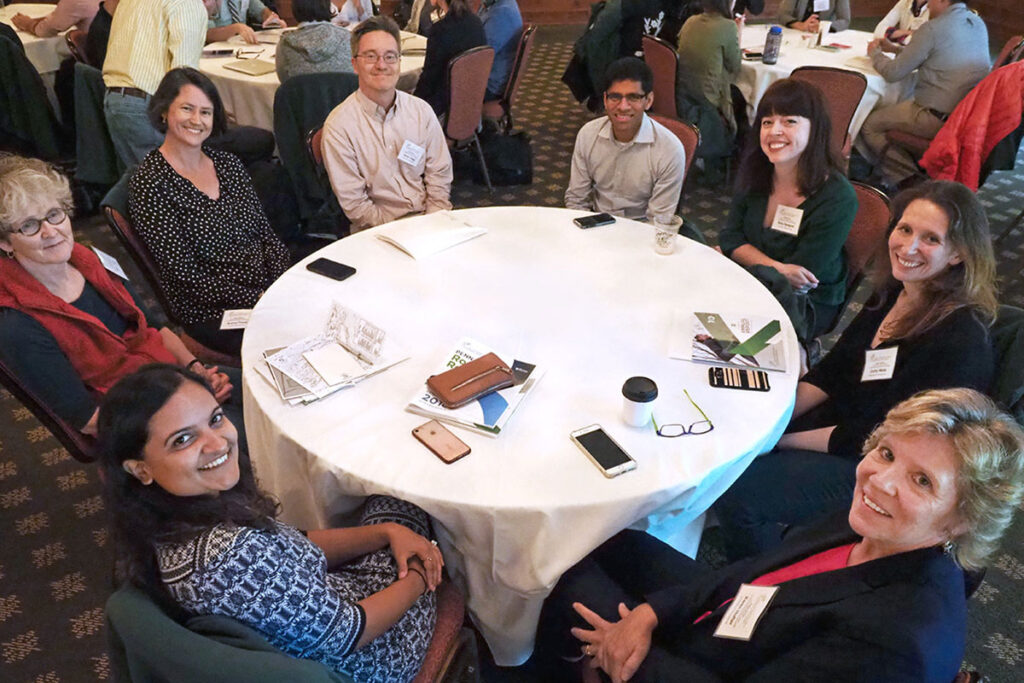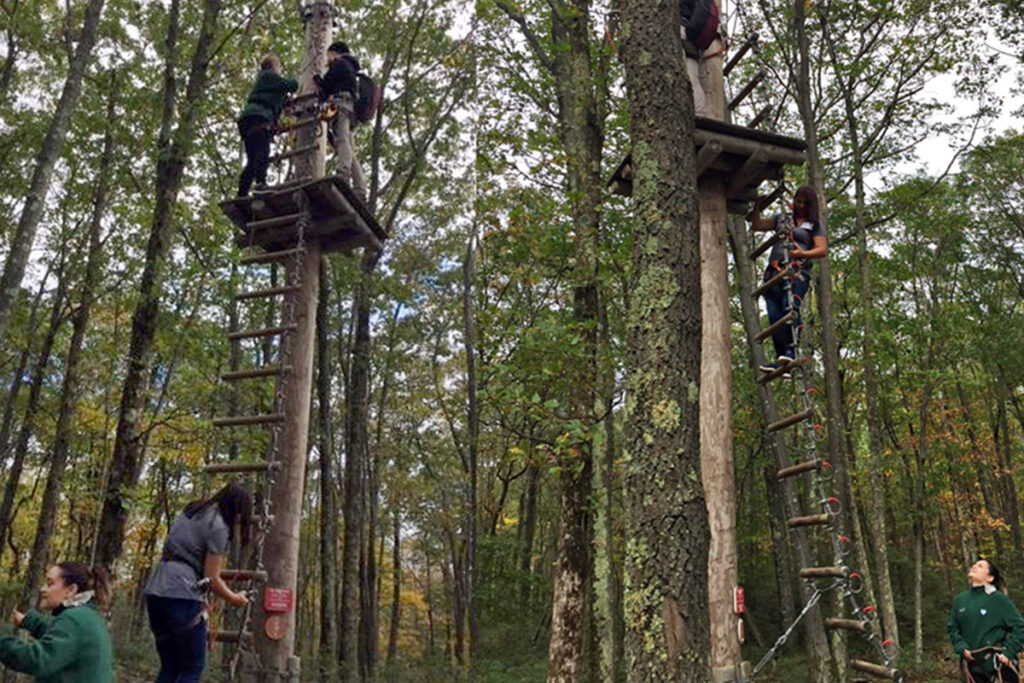News
Mountain Top Behavioral Economics: 2018 Roybal Retreat Photo Page
Ten Dozen Penn and CMU Scientists Gather for 10th Anniversary in the Poconos
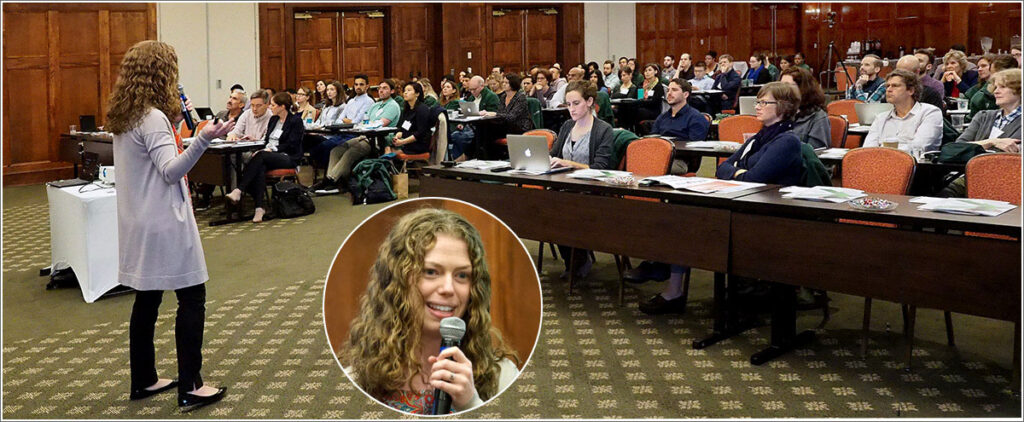
SKYTOP, Pa. — Wharton School Professor and LDI Senior Fellow Katherine Milkman, PhD (above), gave the keynote presentation at the 2018 University of Pennsylvania/Carnegie Mellon University (CMU) Roybal Behavioral Economics Retreat convened at the Skytop Lodge and Conference Center in the Poconos. For much of her research career, Milkman has been focused on the mental processes and influences involved in the formation or breaking of habits, particularly those related to health. As others in her field have found, some study interventions have succeeded in lessening or intensifying certain habits (or lack thereof). However, those same successes tend to fade quickly once the intervention has ended. Her current work, in collaboration with Penn School of Arts & Sciences Psychology Professor Angela Duckworth, PhD, is the Behavior Change for Good Initiative. They have assembled an interdisciplinary working group of 40 scientists to study how to achieve behavioral change that lasts beyond the initial intervention — a subject of keen interest for Roybal’s community of behavioral scientists.
The two organizations collaborating in the ongoing NIH P30 Roybal Behavioral Economics Center of Excellence are Penn’s Center for Health Incentives and Behavioral Economics (CHIBE), and CMU’s Center for Behavioral and Decision Research (CBDR). Their annual two-day retreat enables scientists from both universities, as well as affiliated investigators from other schools, to share the latest developments and findings of their ongoing research. This year’s gathering at Skytop coincides with the tenth anniversary of CHIBE’s founding.
Located 120 miles northwest of Philadelphia, Skytop Lodge (above, left) is a massive complex sitting atop a Pocono plateau. Originally opened in the Roaring Twenties as an elegant mountain getaway for well-heeled Philadelphians, it is surrounded by 5,000 acres of dense mountain forests, hiking trails and waterfalls. Above, right is the view from a back patio.
In 2008, Penn’s Center for Health Incentives and Behavioral Economics (CHIBE) began as a project within Penn’s Leonard Davis Institute of Health Economics (LDI). Over the next decade, it rapidly expanded into a nationally and internationally renowned center of behavioral economics research in its own right. Barely a dozen participants attended its first Roybal retreat. This tenth-year anniversary gathering at Skytop drew ten dozen scientists, staffers and trainees. The green CHIBE coats (above) were a 10th anniversary touch.
As he opened the event (above, left), CHIBE Executive Director and LDI Senior Fellow Kevin Volpp, MD, PhD, reviewed a decade of work and accomplishments by CHIBE-affiliated researchers and faculty. In the 2008 founding year, the initial group published 24 peer-reviewed articles. Each year after that, the number of CHIBE researchers and their published output rose dramatically. In 2017, the group published nearly 500 peer-reviewed papers, and is on track to meet or exceed that this year. Over the last decade, they have contributed 3,443 articles to their field of study. Above, right, Volpp also released CHIBE’s new annual report and announced that he would be taking a six-month sabbatical starting in January and named Nursing School Professor and LDI Senior Fellow Alison Buttenheim, PhD, Interim Director of CHIBE for that period.
In her presentation, Perelman School of Medicine Assistant Professor and LDI Senior Fellow Heather Schofield, PhD (above, left), detailed her team’s current sleep deprivation research project in Chennai, a city of 7 million in southern India. Since most of the current evidence about sleep deprivation was gathered by lab sleep studies in the developed world, “we know very little about how the poor sleep in developing countries,” she explained. Her project is producing the first accurate measurement of sleep in a developing-country environment and exploring its downstream effect on economic, health and decision-making outcomes. Above, right in recent years, CHIBE researchers have undertaken large research projects involving the health care of employees, customers and member populations of major insurers, large corporations, labor unions and other entities. The major benefits and substantial challenges of such asymmetrical research collaborations were a focus of a retreat panel moderated by former Penn faculty member and current Director of the Division of Biostatistics at NYU Langone Health Andrea Troxel, ScD. The three panelists were CHIBE faculty who have experience building relationships and working with external entities: Scott Halpern, MD, PhD, Professor of Medicine at the Perelman School of Medicine and an LDI Senior Fellow; Alison Buttenheim, PhD, MBA, Associate Professor at both Penn’s School of Nursing and the Perelman School, and an LDI Senior Fellow; and Amol Navathe, MD, PhD, Assistant Professor at the Perelman School of Medicine, and an LDI Senior Fellow.
Wharton School Associate Professor of Business Economics and Public Policy Iwan Barankay, PhD (above, left), presented on his randomized, controlled trial of financial incentives for habit formation in statin adherence. Above, right, audience members pay keen attention to presentations which often contain insights and ideas directly relevant to their own projects.
The widespread failure of mental health providers to use the latest evidence-based therapies was the focus Penn Professor of Psychiatry and LDI Senior Fellow David Mandell‘s presentation (above, left). Mandell, ScD, is the Director of the Center for Mental Health Policy and Services Research (CMHPSR) at the Perelman School of Medicine, and one of three co-directors of a NIMH P50 center exploring how behavioral economics and implementation science can combine to expand the use of evidence-based mental health care therapies. That P50 center is a collaboration run by CHIBE and CMHPSR. Above, right, the remarks of Perelman School Adjunct Professor and LDI Senior Fellow Louise Russell, PhD, reprised her recent presentation to the National Academy of Medicine Committee on a National Strategy for Cancer Control in the United States. Russell is a health economist renowned for her work in the field of cost effectiveness analysis. She detailed the ways in which many current U.S. cancer screening practices are not cost effective.
Presenter Rahul Ladhania (above, left) has a degree in Materials Engineering and is currently a PhD candidate at CMU’s Heinz College of Information Systems and Public Policy. He discussed his exploration of how certain kinds of observational data can be used to more accurately estimate the heterogeneous effects of how individual subjects within a study cohort respond differently to an intervention being tested. Above, right, the willingness or reticence of end-stage renal disease patients to ask for live kidney donations is the study subject of Carnegie Mellon PhD candidate Ania Jaroszewicz, MS. She is a mentee of George Loewenstein, PhD, Co-Director of the Roybal Center and Director of CMU’s Behavioral Decision Research Program.
Damon Centola, PhD (above, left), an Associate Professor and Director of the Network Dynamics Group at Penn’s Annenberg School for Communications, discussed his new book published in June by Princeton University Press, How Behavior Spreads: The Science of Complex Contagions. The work focuses on the use of web-based methods to understand how changes in people’s social networks can alter their behaviors, and explores how these insights can be applied to solve problems of organizational change, cultural evolution, and social innovation in a variety of fields, including health care. Above, right, Kit Delgado, MD, is an Assistant Professor of Emergency Medicine at the Perelman School of Medicine, an LDI Senior Fellow, and Director of the Behavioral Science and Analytics For Injury Reduction (BeSAFIR) Lab. He discussed his research testing interventions to reduce motor vehicle crash injuries and deaths related to young drivers’ inappropriate use of smart phones and intoxicants.
When CHIBE was first launched ten years ago, one of the early problems the organization addressed was the complexity of setting up and managing all the elements of behavioral economics research studies. These investigations often employ extensive two-way digital communications, financial transactions, and the gathering, processing and feedback of huge amounts of biometric data remotely collected from each study subject. The solution was the building and launch of a unique central data utility called Way to Health that enables researchers to use web-based dashboards to build and control their study infrastructure. Constantly enhanced and upgraded, this sprawling digital research utility is now part of the Penn Medicine Center for Health Care Innovation. It is currently used not only by other departments throughout Penn’s schools and the Children’s Hospital of Philadelphia, but by research centers in Harvard, Duke, Johns Hopkins, Cornell, and Columbia Universities as well. Above, Mohan Balachandran, MA, MS, the Chief Operations Officer of Way to Health, and Christianne Sevinc, MPH, Applications Analyst of the service, hosted a retreat session demonstrating Way to Health’s general operation and new enhancements for those researchers who are new to the system.
Socializing before heading out to dinner are (above, left) Joanna Hart, MD, MSHP, Instructor of Medicine in the Perelman School of Medicine and LDI Senior Fellow; David Asch, MD, MBA, Executive Director of the Penn Medicine Center for Health Care Innovation and LDI Senior Fellow; and Roy Rosin, MBA, Penn Medicine Chief Innovation Officer and LDI Senior Fellow. Above, right, are (lower left, going clockwise) Akriti Mishra, MS, CHIBE Statistical Analyst; Mary Putt, PhD, ScD, Professor of Biostatistics and Epidemiology at Perelman School of Medicine; Andrea Troxel, ScD, Director of the Division of Biostatistics at NYU Langone Health; Kevin Volpp, MD, PhD, CHIBE Director and LDI Senior Fellow; Harsha Thirumurthy, PhD, CHIBE Associate Director; Kelly Zentgraf, MA, Clinical Research Coordinator at the Center for Mental Health Policy and Services Research; Cathy Reitz, MPH, CHIBE Clinical Research Coordinator; and Karen Hoffer, BS, CHIBE Project Manager.
Always a lively social event, the retreat’s evening poster session (above, left) highlighted the work of dozens of established behavioral scientists as well as the trainees they mentor. Above, right, Erich Dress, MPH, MBE, Project Manager of Penn Medicine’s Palliative and Advanced Illness Research Center (PAIR), discusses his poster with Penn’s Scott Halpern, MD, PhD, and Jingsan Zhu, MS, MBA, CHIBE Assistant Director of Data Analytics.
The team-building activities this year were lawn bowling, a nature hike to a mountainside waterfall, and exhilarating zip lines through the treetops. Skytop has built an official bowling green for the genteel sport whose roots go back nine centuries. Above, left, in stylish form, Center for Clinical Epidemiology and Biostatistics Assistant Professor and LDI Senior Fellow Alisa Stephens-Shields, PhD, lets one fly. Behind her are Wharton PhD candidate Samuel Skowronek, CHIBE Biostatistician Erkuan Wang, MA, and Penn Medicine Center for Health Care Innovation Design Strategist Michael Begley, MA. Above, right, George Loewenstein rolls one out toward the “jack” — the little white ball that players try to get close to. Team partner Kevin Volpp looks on while Columbia Law School Associate Professor Kristin Underhill, JD, DPhil, MSc, and CHIBE Associate Director Harsha Thirumurthy, PhD, await their turn. Underhill and Thirumurthy later emerged as the undefeated champions of the lawn bowling tournament.
Photos: Joelle Friedman
The visual payoff of the trek through the mountain trails around Skytop was the arrival at Indian Ladder Falls, a cascade of multiple waterfalls. The name recalls the long history of Native American tribes in the region whose very name — Poconos — comes from the Munsee tribe word “Pakawachne,” and roughly translates to “a place of mountain streams.”
Photos: Jingsan Zhu
A relatively new addition to the Skytop recreational areas is the zip line center. Above, left, CHIBE Administrative Coordinator Dana Opiela joins the zip line guide on the top-left platform, with CHIBE Administrative Coordinator Samantha Fellman about to climb the ladder as Health Care Innovation Center Clinical Operations Specialist Stephanie Brown gets ready next to her. In the other tree photo, Fellman nears the top of the ladder as Brown watches from below. Above, right, hooked up and flying free, Fellman zips out through the treetops.


